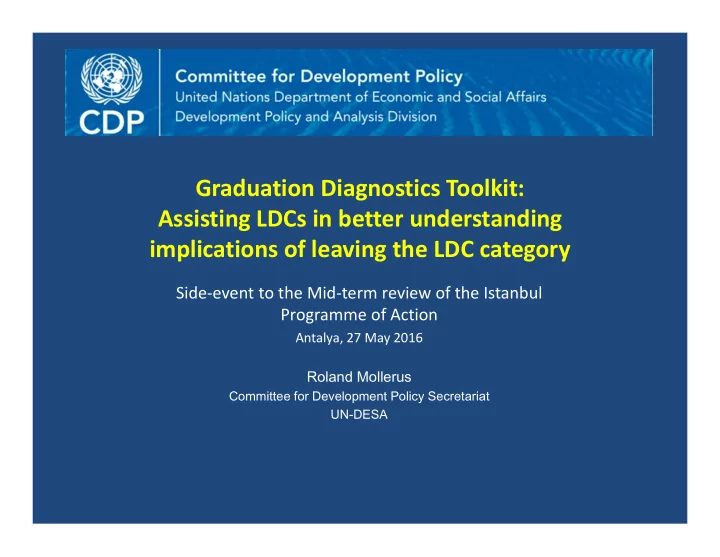

Graduation Diagnostics Toolkit: Assisting LDCs in better understanding implications of leaving the LDC category Side ‐ event to the Mid ‐ term review of the Istanbul Programme of Action Antalya, 27 May 2016 Roland Mollerus Committee for Development Policy Secretariat UN-DESA
Structure 1. The CDP and the LDCs 2. Capacity building by the CDP Secretariat 3. Objective of graduation diagnostics toolkit 4. Outline of the toolkit CDP Secretariat
THE CDP AND THE LDCS CDP Secretariat
Mandates Committee for Development Policy (CDP) : Subsidiary body of ECOSOC (resolution 1998/46) • Policy advice • Identification of LDCs: Triennial reviews Methodology and process Monitoring of graduating and graduated LDCs CDP Secretariat (DESA/DPAD): • Dissemination of CDP work • Substantive support • Capacity development
CAPACITY BUILDING BY THE CDP SECRETARIAT
CDP capacity building objectives 1. Improving information on international support measures (ISMs) � LDCs can’t benefit from support they are not aware of 2. Facilitating access to ISMs � LDCs can’t benefit if support is not accessible 3. Assist countries in preparing for graduation � LDCs ultimately lose access to ISMs specific to LDCs � ISMs can be used until graduation and for certain time after � Access to general assistance remains available � Identifying priority sectors � Graduation diagnostics toolkit falls under the third objective, but builds on work aimed at the first two • Part of multi ‐ year project on building productive capacity and graduation
Improving information on ISMs: WWW.UN.ORG/LDCPORTAL
Facilitating access to ISMs
GRADUATION TOOLKIT: OBJECTIVE
Uncertainty Uncertainty is major constraint to graduation • Timing of graduation • LDC specificity of ISMs • Actual use of LDC specific ISMs • Impact of graduation on ISMs • Likely impact of graduation on development • Managing graduation • Nature of smooth transition strategy
Approaching uncertainty • Uncertainty cannot be fully eliminated! • But it can be reduced • … and it can be managed • Overall approach: • Identify sources of uncertainty • Provide basic information • Explain how to obtain and use detailed information
Graduation diagnostics toolkit Goals • Assist in better understanding LDC ‐ specific support • Better prepare for graduation Objectives • Access to graduation data • Map out type of LDC specific support received • Identify relevant sectors and impact of ISMs • Assess impact on development progress • Promote collaboration between stakeholders • Identify policy priorities • Establish roadmap to graduation • Integrate smooth transition strategy in development strategies • Facilitate transition strategy
GRADUATION TOOLKIT: OUTLINE
Toolkit approach Country input based on obtained information Basic elements of transition strategy
Basic stages of the toolkit Stage 1: Stage 2: Assess timing of Identify relevant graduation ISMs Stage 4: Stage 3: Manage possible Assess impact of loss of ISMs graduation Basic elements of transition strategy
Stage 1: Timing of graduation Information directly accessible from toolkit •General timelines from graduation procedures •Role of different actors •Government •United Nations GA and ECOSOC •CDP •UNCTAD •UNDP •Country data from last review Guidance for getting more detailed information •Contact planning institution, think tanks, Ministries •Information on expected future progress in LDC criteria Information is recorded in toolkit Expected timeframe for graduation
Stage 2: Identifying ISMs Information directly accessible from toolkit •General overview of ISMs •List of ISMs the country is eligible to receive •Certain WTO provisions not relevant for non ‐ Members •Link to LDC Portal for further detail Information on which ISMs could be used until graduation Information on potential losses in support
Stage 2: Identifying ISMs (cont’d) Basic information on actual use of LDCs •Basic data on exports covered by trade preferences •Sectors producing goods covered by preferences •Information on ODA receipts and conditions •Projects under the LDC Fund administered by GEF •Enhanced integrated framework (EIF) studies and projects •WTO special & differential treatment Guidance on how to obtain detailed information •Suggested stakeholders to be contacted for detailed information •Business associations, Chamber of Commerce, •Ministries, National focal points •International agencies •Development partners Stakeholder responses and views recorded in toolkit Information on relevance of ISMs List of sectors possibly affected by graduation Information on ISMs not yet used
Stage 3: Impact of graduation Basic information on impact of graduation on ISM • General smooth transition provisions • List of smooth transition measures for ISMs actually used • Impact assessments prepared by DESA Guidance on gathering further information •Link to international organizations •UNDP, UNCTAD, ESCAP, ECA, … •List of sectors to be explored for further studies •E.g., impact of loss of preferences on exports and employment •List of stakeholders that are critical for managing graduations •List of key development partners that provide ISMs Information is recorded in toolkit Information on what is ‘at stake’ in graduation Sectors/issues that need to be managed
Stage 4: Managing graduation • Main components • Establish coordination mechanism • Assistance from UN Resident Coordinator available • Communicate impacts to non ‐ governmental stakeholders • Dialogue and negotiate with development partners • Map graduation impacts on national development and sectoral strategies • Report to CDP to bring concerns to the international attention • Toolkit contains description of components • Toolkit provides experiences by other countries Elements of graduation strategy
Questions • Do you think the toolkit is useful for countries? • What additional information should be covered? • Who could be the main users within countries? • Would you use the toolkit? • Is the approach flexible enough to reflect differences between LDCs?
Thank Y Thank Y ou Contact: Roland Mollerus Committee for Development Policy Secretariat Department of Economic and Social Affairs United Nations email: mollerus@un.org http:// www.un.org/en/development/desa/policy/cdp CDP Secretariat/UN-DESA
Recommend
More recommend